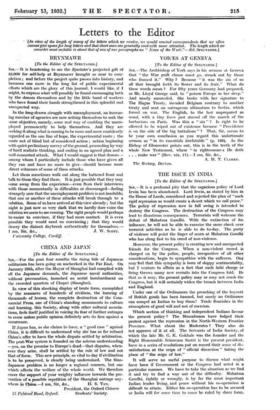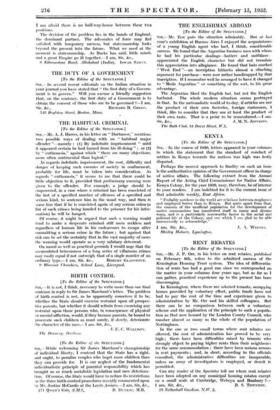THE ISSUE IN INDIA
[To the Editor of the SPECTATOR.] Sin, —It is a profound pity that the sagacious policy of Lord Irwin has been abandoned. Lord Irwin, as stated by him in the House of Lords, considered and rejected the plan of "such rigid repression as would create a desert which we call peace." The policy of repression now in full swing is intended to destroy the Congress. The destruction of the Congress may lead to disastrous consequences. Terrorists will welcome the defeat of Mahatma Gandhi. With the extinction of his influence, he will not be able to exercise the same check over terrorist activities as he is able to do to-day. The party of violence will point the finger of scorn at Mahatma Gandhi who has clung fast to his creed of non-violence.
Moreover, the present policy is creating new and unexpected friends for the Congress. When a non-violent crowd is charged on by the police, people, irrespective of all other considerations, begin to sympathise with the sufferers. One may feel that this sympathy is born of sloppy sentimentality, but I venture to affirm as a fact that each lathi charge or firing throws many new recruits into the Congress fold. Be that as it may, the present policy may or may not crush the Congress, but it will certainly widen the breach between India and England.
Under one of the Ordinances the preaching of the boycott of British goods has been banned, but surely no Ordinance can compel an Indian to buy them! Trade flourishes in the atmosphere of good will and not of coercion.
Which section of thinking and independent Indians favour the present policy ? The Mussulmans have lodged their protest against the repression in the North-Western Frontier Province. What about the Moderates ? They also do not approve of it at all. The Servants of India Society, of Which the late Mr. G. K. Gokhale was the founder and the Right Honourable Srinavasa Sastri is the present president, have in a series of resolutions put on record their sense of dis- satisfaction at the reign of " official discretion " taking the place of "the reign of law."
It will serve no useful purpose to discuss what might have been if Government or the Congress had acted in a particular manner. We have to take the situation as we find it and try to find a way out of the difficulty. Mahatma Gandhi, rightly or wrongly, is by far the most important Indian leader living, and peace without his co-operation is difficult to attain. Either his co-operation has to be secured or India will for some time to come be ruled by sheer force.
I am afraid there is no half-way-house between these two positions.
The decision of the problem lies in the hands of England, the dominant partner. The advocates of force may feel satisfied with temporary success, but statesmanship looks beyond the present into the future. What we need at the moment is statesmanship. As Burke has said, little minds and a great Empire go ill. together.—I am, Sir, &c., Edmonstone Road, Allahabod (India). IswAR SARAN.







































 Previous page
Previous page